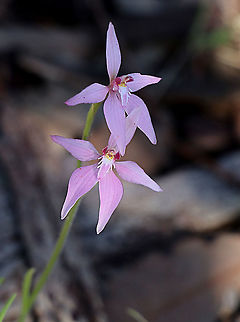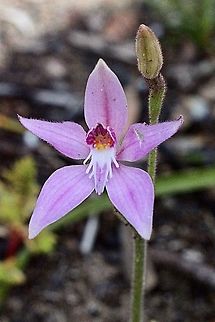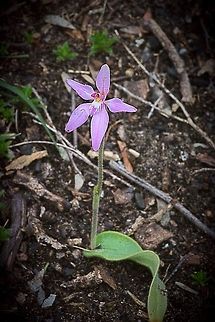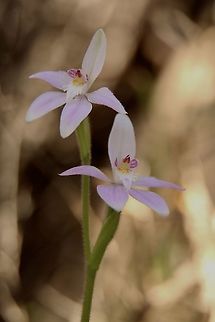
Appearance
It has a single, hairy leaf and up to four pink flowers. It is easily distinguished by its relatively large, green leaf, and pink flowers on an unusually tall spike.''Caladenia latifolia'' is a terrestrial, perennial, deciduous, herb with an underground tuber and which often grows in large colonies. It has a single, oblong to lance-shaped leaf, 80–180 mm long and 3–30 mm wide.
The leaf usually lies flat on the ground and is green and densely hairy on both sides. Up to four pink flowers 20–40 mm long and 20–30 mm wide are borne on a stalk 200–450 mm tall.
The back surface of the sepals and petal is a covered with glandular hairs and is a lighter shade of pink. The dorsal sepal is erect, oblong to lance-shaped, 12–16 mm long and 3–4 mm wide.
The lateral sepals are 13–17 mm long, 4–6 mm wide and spread widely. The petals are 10–14 mm long and 3–4 mm wide, spread widely and sometimes have a few irregular teeth on the sides.
The labellum is 5–8 mm long, 6–9 mm wide, pink or white and has three distinct lobes. The lateral lobes are pink with dark stripes, narrow oblong in shape, and sometimes have small teeth on the edge.
The mid-lobe is white with a pinkish tip, triangular in shape and has three or four long, linear teeth on each side. There are two rows of yellowish calli with white tips in the centre of the labellum, forming a semi-circle. Flowering occurs from August to December.
This orchid sometimes forms hybrids with the cherry spider orchid and with the cowslip orchid. On rare occasions it hybridises with the large white spider orchid.

Naming
''Caladenia latifolia'' was first described in 1810 by Robert Brown and the description was published in ''Prodromus Florae Novae Hollandiae''. The specific epithet is derived from the Latin words ''latus'' meaning "broad" or "wide" and ''folia'' meaning "leaves", referring to the broad leaf of this species.Four varieties have been described:
⤷ ''Caladenia latifolia'' var. ''angustifolia'' Benth.
⤷ ''Caladenia latifolia'' var. ''glandula'' Ewart & B.Wood
⤷ ''Caladenia latifolia'' R.Br. var. ''latifolia''

Distribution
Pink fairies occurs in Victoria, South Australia, Tasmania and Western Australia.In Victoria it mostly grows in near-coastal areas in sand and is only rarely found inland.
In South Australia it is widespread in the south east where it grows in sand in near coastal areas.
In Tasmania it grows in coastal scrub and heath in the north of the island.
In Western Australia, pink fairies occurs between Kalbarri in the north and Israelite Bay in the south, growing in a wide range of habitats from coastal heath to the margins of inland salt lakes.

Status
In Western Australia ''C. latifolia'' is classified as "Not Threatened" by the Western Australian Government Department of Parks and Wildlife.References:
Some text fragments are auto parsed from Wikipedia.